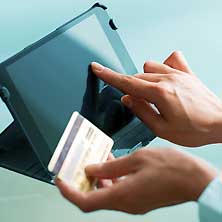Tips for managing your checking account
- Items on your checking account statement may be presented differently, including by check number, or listed by the name of the company you paid. Others may show small images of your checks. Always review all of the charges on your account statement to make sure they match your records.
- Most banks today charge a fee to return copies of canceled paper checks.
- Most banks do not return checks at all. If you need a canceled check to prove that you made a payment, you can ask for a copy of that check.

...for managing your debit card
- Check your account statement often. Banking online allows you to view your statement as often as you like, and transactions appear almost immediately. Your liability under federal law for unauthorized use of your ATM or debit card depends on how quickly you report the loss. If you report an ATM or debit card missing before it's used without your permission, the Electronic Fund Transfer Act (EFTA) says the card issuer cannot hold you responsible for any unauthorized transfers, according to the Federal Trade Commission. If unauthorized use happens before you report it, your liability under federal law depends on how quickly you report the loss.
- Debit cards typically involve greater liability risk than credit cards. It is generally easier to reverse a questionable transaction if you've used a credit card because the funds are not deducted from your checking account, as they are with a debit card.
- Some financial institutions charge transaction fees when you use a debit card.
- Watch for a hold on your checking account by merchants that you pay with a debit card. They may freeze a certain dollar amount in your checking account to be sure you can make good on your debit card purchase.
...for managing your credit card
- Your ultimate liability for fraudulent use of a credit card is generally $50. Thus, if someone steals your card or card number and you receive a charge on your statement for something you did not buy, you will owe $50 if any liability is imposed, once you report the discrepancy. If you lose your card and report the loss before the card is used, the Fair Credit Billing Act says the card issuer cannot hold you responsible for any unauthorized charges.
- If you pay the minimum payment each month, you will incur more in finance charges than you do by paying more every month, and it will take far longer to pay off your account balance.
- If you expect always to pay your monthly bill in full—and other features such as frequent-flyer miles don't interest you—your best choice for a credit card may be a card that has no annual fee.
- If you sometimes carry over a balance from month to month, you may be more interested in a card that carries a lower interest rate, which is stated as an annual percentage rate, or APR.
For further credit and debit card advice, go to federalreserve.gov/creditcard/ or consumer.ftc.gov/articles/0218-electronic-banking.
For general consumer information, go to federalreserve.gov/consumerinfo/default.htm.
Registering complaints about a bank or depository institution
The Federal Reserve investigates complaints about certain types of banks or will direct you to the appropriate agency. If you think your financial institution has been unfair, deceptive, or has violated a law or regulation, you may file a complaint. Before submitting your complaint online or by writing or calling, try to settle the problem with your bank first. If you are unable to resolve the problem, send an online complaint about the bank that the Federal Reserve supervises. Or, if you prefer, you may write or call.
Phone: (888) 851-1920
TTY: 7-1-1 (via a relay service)
Fax: (877) 888-2520
E-mail: ConsumerHelp@FederalReserve.gov
Find more information or submit a complaint online:
federalreserveconsumerhelp.gov/about/ready-to-file-a-complaint.cfm
Write: Federal Reserve Consumer Help, P.O. Box 1200, Minneapolis, MN 55480
Include the following information when contacting the Federal Reserve:
- Your name, address, and daytime telephone number, including area code.
- The name and address of the bank involved in your complaint or inquiry.
- The names of those you dealt with at the bank, along with the dates.
- A detailed description of the complaint. State what happened; the more information the Fed has about the problem, the faster the problem can be investigated.
- Copies of any documents that may help the Fed investigate your complaint. (Please do not send original documents.)
Do not send account numbers, Social Security numbers, or other information you would normally seek to keep private.



